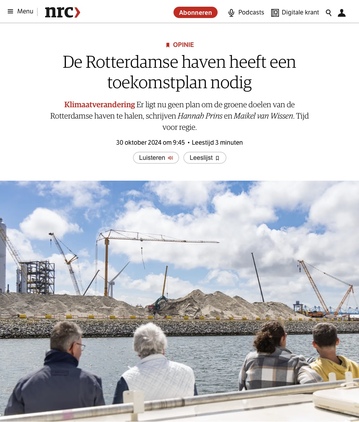In an op-ed in the Dutch leading newspaper NRC our colleagues Hannah Prins and Maikel van Wissen argue that the Port of Rotterdam needs a plan for a fossil phase-out in the port. Read a machine translation of the op-ed below.

The Port of Rotterdam needs a plan for the future
There is currently no plan to achieve the climate goals of the Port of Rotterdam, Hannah Prins and Maikel van Wissen write. Time for action.
October 30, 2024, 9:45 AM
There is sometimes a lot of space between words and deeds. Last week, the Netherlands Environmental Assessment Agency warned that no sector is on track to achieve the climate goals. There is only a five percent chance of achieving the national climate goals for 2030.
That should come as no surprise. The government and the business community are mainly focusing on innovations, which means that difficult choices are being postponed. Unfortunately, transitions do not work that way. Ambitious policy does not only mean opting for an innovative and sustainable economy, but also saying goodbye to harmful activities.
It is clear that Tata Steel and Schiphol dominate this conversation, but at the same time the transition in the port of Rotterdam is creaking and groaning, as professor Jan Rotmans wrote in the Algemeen Dagblad last week. Yes, work is in full swing on wind and solar parks, hydrogen power stations and underground storage of CO2 emissions. But the hard nuts are not cracked: how do we phase-out our fossil activities and create the economy of the future?
Direct and indirect emissions
The port of Rotterdam is the largest fossil port and industrial complex in Europe. Not only are there oil refineries, petrochemical factories and power stations in the port, but it is also directly connected to the fossil industry in Antwerp and the Rhine-Ruhr area via an extensive pipeline network. Furthermore, Rotterdam is the largest bunker, transit and storage port for fossil fuels in Europe.
This makes it the heart of the fossil industry and facilitates the emission of enormous quantities of greenhouse gases. The direct emissions of the industry in the port area alone account for 17 percent of the total emissions of the Netherlands. The indirect emissions that the port facilitates, in the Netherlands and abroad, are many times greater.
The fossil fuels that run through the port of Rotterdam lead to the emission of greenhouse gases here or elsewhere. The emissions facilitated by the port are enormous: dozens of times the emissions of Tata Steel or Schiphol. As such, the port of Rotterdam contributes to climate change, with consequences that are already being felt worldwide, such as flooding, heat waves, rising sea levels and desertification.
It is time for the Port of Rotterdam Authority to come up with a plan for phasing out fossil activities in the port, so that there is room for new, green initiatives. Without such a plan, the Rotterdam port area is well on its way to becoming a 'Detroit on the Maas', a ghost port full of old industry, with disastrous consequences for the climate, employment and the future of young people and next generations.
A concrete phasing-out plan is lacking
While there is little talk about greening existing industries, there is no plan for phasing out fossil activities in the port of Rotterdam. The company praises itself as one of the most innovative ports in the world. Anyone who looks at the future plans of the state-owned company will therefore initially see many good things. Both the Port Authority and its shareholders (the central government and the municipality of Rotterdam) have committed themselves to the objective of a 55 percent reduction in greenhouse gases by 2030 and a net zero port by 2050. But there is no concrete plan. The Port of Rotterdam Authority can be expected to manage the Port of Rotterdam and not leave this to fossil customers who depend on extending their fossil activities for as long as possible for their survival.
Space is scarce in the Port of Rotterdam, which requires clear choices about how the available space is used. In addition, the immense transition that the port is facing takes a lot of time. There is no time left to dawdle. By not making clear choices, the port will continue on the existing path, with all the consequences for the climate that entails. There is also a significant risk that the Port of Rotterdam will be left with an outdated, fossil industry by 2050 for which there is no longer any demand, while the opportunity to develop a green, sustainable industry has passed the port by.

It is time for the Port of Rotterdam Authority to come up with a plan for phasing out fossil activities in the port, so that there is room for new, green initiatives. Without such a plan, the Rotterdam port area is well on its way to becoming a 'Detroit on the Maas', a ghost port full of old industry, with disastrous consequences for the climate, employment and the future of young people and next generations.